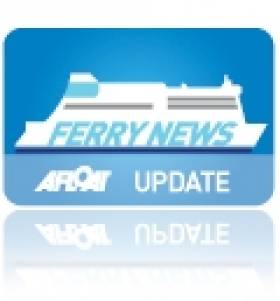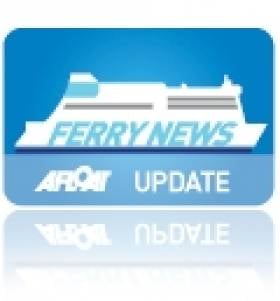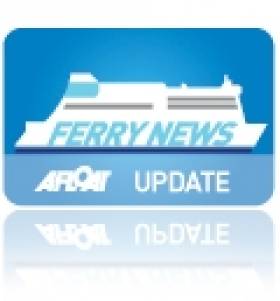Displaying items by tag: Competition Commission
Sponsorships of Ice-Sea Giants
Stena Line themselves will be looking forward to introducing their own giants when two of the largest ferries are to be introduced on the North Channel in the Autumn. The two chartered 30,000grt sisterships are Superfast VII and Superfast VIII. To see the vessel breaking through an an ice-flow, click PHOTO. The 203m long pair can take 1,200 passengers, around 660 cars or 110 freight vehicles. To read more about these 'Superfast' class vessels and the new £80 port terminal click HERE.
The company's area director Michael McGrath said: "It's quite fitting that we are teaming up with the Stena Line Belfast Giants at this time as we prepare to introduce two of the largest ferries every to sail between Northern Ireland and Scotland when we open our new route and port in Cairnryan this November. The two Superfast vessels will be another two Giants to add to our team."
Last year Stena Line made a £40m acquisition of the Belfast to Liverpool (Birkenhead) and Heysham routes and four vessels from DFDS Seaways. The deal was approved by the Irish authorities but remained subject to clearance from the UK's Competition Commission until late last month when they fully approved the acquisition.
This brings to six routes the company runs on its Irish Sea route network where over two million passengers were carried each year, more than its rival ferry operators combined.
- DFDS Seaways
- Belfast Harbour
- Stena Line
- North Channel
- Competition Commission
- BelfastHeysham
- Superfast VII
- Superfast VIII
- Belfast Lough News
- Belfast Port
- Odyssey Arena
- Belfast Giants
- BelfastCairnryan
- New ferryport
- Nottingham Panthers
- Sheffield Steelers
- Hockey Festival Weekend
- BelfastLiverpool (Birkenhead)
- Irish Sea ferry companies
- Irish icehockey
Irish Authorities Approve Stena / DFDS Merger
Of the two services, the Belfast-Liverpool (Birkenhead) is for passengers and freight while the and Belfast-Heysham port route is exclusively for freight-only users. To read more about the decision from the authority click here.
In February the UK's Office of Fair Trading (OFT) referred Stena AB's acquisition from DFDS A/S to the Competition Commission, conclusions on the report are not expected to be made until 25 July. To read more about the merger click here.
In the meantime the Belfast-Liverpool (Birkenhead) route continues trading under the name of Stena Line Irish Sea Ferries Ltd which is separately operated to Stena Line's other Irish Sea routes.
Sailings on the 8-hour route are run by the Italian built 27,510 tonnes ro-pax twins Lagan Seaways and Mersey Seaways which have been in service since the newbuilds were launched in 2005.
As the acquisition remains subject to regulatory clearance, passengers intending to travel on the route can continue to make bookings through the DFDS Seaways website by logging onto this link.
In addition the acquisition involved the sale of the South Korean built freight-ferries Hibernia Seaways and Scotia Seaways which operate Belfast-Heysham sailings.
Irish Sea Ferry Deal Under Review
Stena Line's acquisition of DFDS Seaways Irish Sea services in December, has now been referred to the UK's Competition Commission by the Office of Fair Trading (OFT).
The £40m ferry deal for two routes, Belfast-Birkenhead (run by two chartered ro-pax ferries) and the Belfast-Heysham freight-only service, included two 114-trailer capacity vessels.
The Competition Commission is expected to submit its findings by the end of July while the Irish Competition Authority is also still investigating the merger. To read more about this, click the BBC report here.


























































